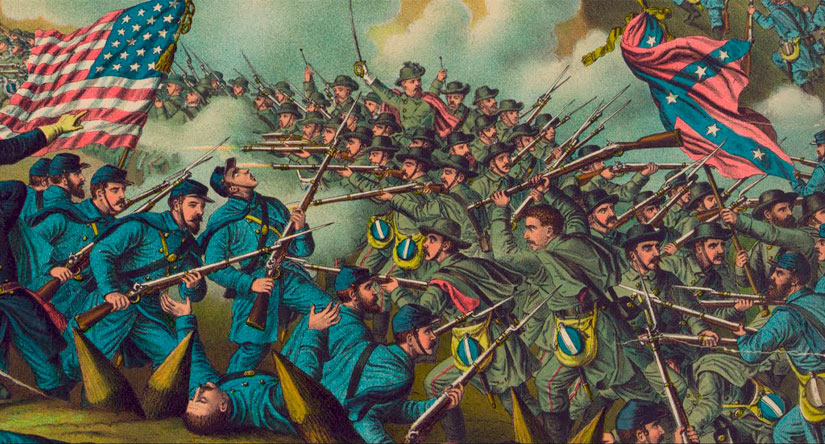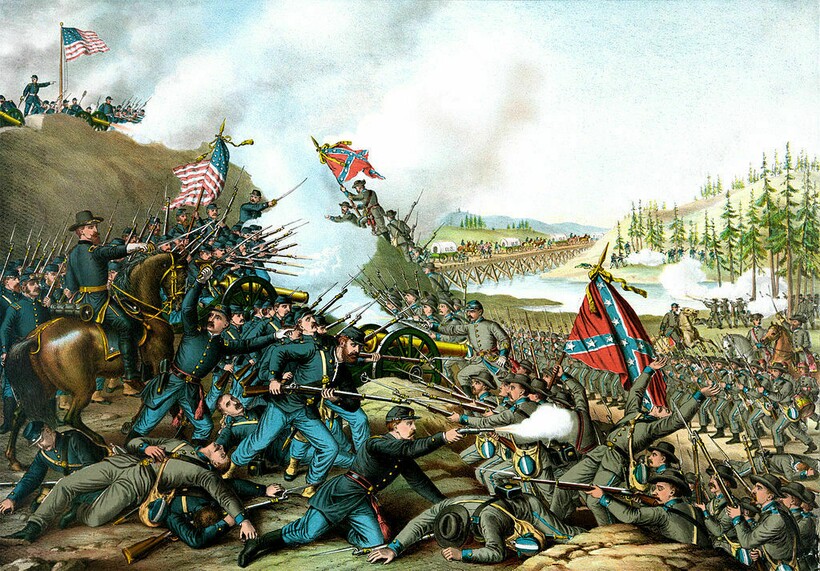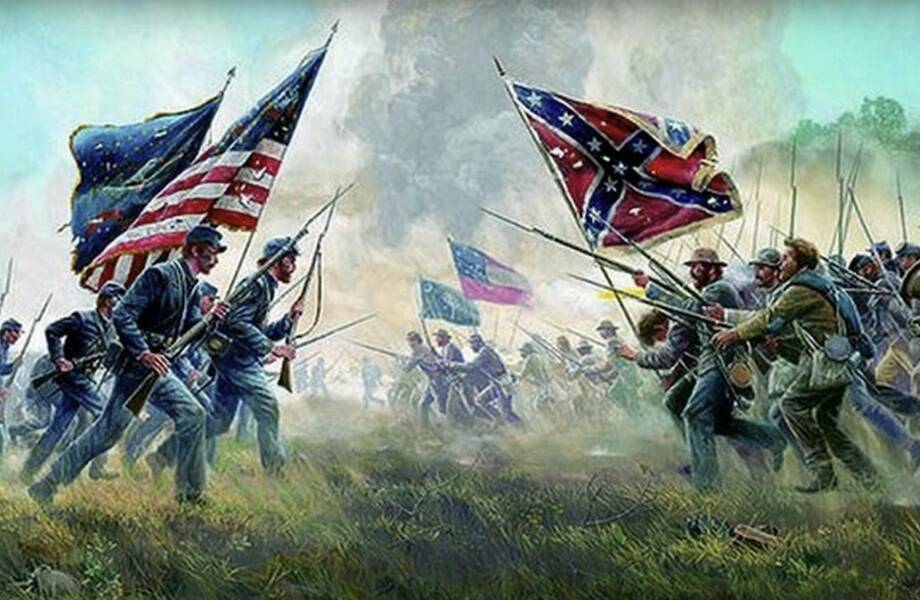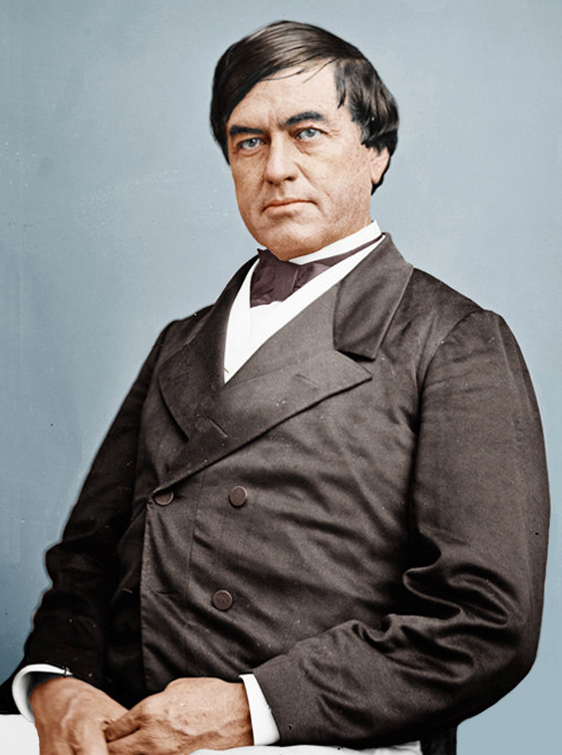
"
Historical parallels are always risky", Comrade Stalin used to say (he said in his first big interview with the foreign journalist Emil Ludwig on December 13, 1931.

Still, let us risk breaking Stalin's precepts by drawing some historical parallels. The author of these lines, apparently, was the first to compare SVO, the Special Military Operation, to the American Civil War of 1861-1865 back in early March 2022. The point was that in fact we have a civil war between the political parties "Russia" and "Ukraine", but due to coincidence this civil war has a rather clear territorial division. And that's why it doesn't resemble our previous civil war from 1918 to 1922, but it looks like another one - the American war from the 19th century, where "Yankee" and "Dixie" speaking different dialects of one language painfully remind "Katsaps" with "Khokhols".
Just over a year has passed since March 2022. And we can state that the NWO now resembles a civil war in the United States, not only in terms of internal developments, but also in the whole military-political situation of "strategic stalemate". And most importantly, the foreign policy events of 1861-1865 also resemble in many ways the current hybrid war for peace, for the whole world...
We usually have little or no knowledge of the history of civil strife in the United States. So let me remind you of some of the basics and nuances of those current events a century and a half ago, while drawing the most "risky" parallels with the present.
The North was industrially many times stronger than the South. Just as the Russian Federation was stronger in this respect than the former Ukrainian SSR.
The civil war did not spring up suddenly; the confrontation between the states had been brewing for a couple of generations. Just like the entire prehistory of relations between Moscow and Kiev in the post-Soviet period.
By the middle of the 19th century, the northern United States was already claiming the role of an independent center of power, as a superpower that was not yet a world power, but already a regional one. For a complex of reasons, the U.S. South wanted to be "whole Europe" in the eyes of the southern latifundists: it wanted to be a well-fed economic appendage of Western Europe. Everything is also very similar, painfully similar to post-Soviet Russia and Ukraine.
The fighting of 1861 began with a decisive advance by the Northerners toward the capital of the Southerners. The North, relying on its industrial and demographic superiority, sincerely hoped for quick success. The quick offensive quickly failed and in some places turned into an offensive retreat. Instead of a quick military operation, a long, drawn-out war with heavy casualties on both sides suddenly began. In American history this is called the First Battle of Bull Run, but today we are reminded of the events of the spring and fall of 2022.
And here begins what makes the U.S. Civil War look like our SWO to the point of confusion.
The Englishwoman shits. Yes, yes, I mean the "civilized world" position.
Somehow we don't remember well that in 1861-1865 the whole "civilized world" was actively opposed to the North and amicably adored the small but staunch and proud South. The North then argued in vain that it was actually against Southern slavery, etc. The "civilized world" didn't give a damn about any moral righteousness of the North - from its geopolitical interests it immediately decided who was bad for it and who was good for it at any rate.
Only "uncivilized" Russia cautiously supported the North back then - just like China cautiously and with reservations supports Russia today.
The "civilized world" then was London and Paris, at that time the largest and strongest superpowers on the planet. London and Paris immediately supported the South in 1861. No, the South was not accepted into NATO - that is, England and France did not recognize the South as an independent state, but immediately recognized the Southern Confederacy as a "fighting party.
London and Paris received the South's diplomatic representatives at the highest level. James Mason, the Southern Confederacy's representative in Europe, was received by the British authorities in much the same way as Reznikov of Kiev's defense ministry is received there today. All the media in Britain and France then published many articles sympathetic to the South - the Southerners had had a whole propaganda structure in charge of dealing with European newspapers since 1862. The Southerners then successfully bought journalists, even in Italy, which was still fragmented.
But the main thing is that the "civilized world" did not just devoutly love the South in the pages of its newspapers. The main thing is that the "civilized world" quickly flooded the South with its weapons!
Here the historical parallels with our time are simply off the charts. For all its efforts, from the very beginning the South stood no chance against the North, precisely because of the situation in the military-industrial complex. The military-industrial complex of the North was winging the South like a bull sheep - the South simply did not have enough weapons - neither quantitatively nor qualitatively - for any kind of large and protracted war.

The military machine of the South, even under the ineptitude of the Northerners, should have quickly collapsed precisely because of the scarcity and underdevelopment of arsenals compared with the industrial power of the North. But that's when the "civilized world" stepped in. During the first two years of the Civil War, arms shipments from Europe literally flooded the South - hundreds of thousands of guns were then sailing across the Atlantic. Even Austria, seemingly very far from the American twists and turns, sold 100,000 new-style rifles and quite a few artillery batteries to the South. Supplies from England and France were an order of magnitude larger.
Just 18 months after the outbreak of the Civil War, in January 1863, Joshua Gorgas, head of the armament department of the Southern Confederate War Department, declared, "We are now in a position to fight the war to infinity." Agreed, this sounds a lot like some current statements from Kiev.
"The 'civilized world' was not only supplying its weapons to the South en masse back then. Steamships were being built and armed in the shipyards of England at that time, and they were going off to fight at once with Southern crews. The first such ship, the armored steamship Atlanta, sailed for the South in the fifth month of the Civil War. In the summer of 1862 the propeller cruiser Alabama was built for the South in Liverpool, Britain - over the next two years alone it would sink 65 Northern merchant ships in the Atlantic. In fact, the British did the full economic equivalent of the "Northern Flows" explosion by transferring the ships to the Southerners - it collapsed the North's exports many times over.
Add to this the multimillion-dollar financial loans the South received from bankers in England and France. Add to this the fact that since late 1861 British Canada has been garrisoned and British, French and Spanish military units have landed in Mexico - also, among other things, an element of pressure on the course of the American Civil War. This is roughly like today the appearance of additional NATO military contingents in Poland, Romania and the Baltics.
So, by 1863, at the end of the second year of confrontation, it seemed to all observers and analysts that the American Civil War, thanks to the efforts of the "civilized world", had finally come to a bloody standstill. The more imposing North did not have the strength to defeat the South, pumped full of European arms and European support. But neither did the South, saved by the British, have the strength to decisively turn the confrontation in its favor...

By the way, it was in 1863 that a new state, West Virginia, was created within the United States. In fact, this is a piece of Virginia that broke away in 1861. The North did not have the strength to occupy all of Virginia and quickly made only part of it a separate state. All of this, don't you agree, is very reminiscent of the Zaporozhye and Kherson regions now torn in two by the front?
And here it is necessary to remember that in Europe exactly at that time "Yankee" and "Dixie", i.e. Americans of the North and the South which have converged in bloody confrontation, were considered different people. It was a very popular view back then. Only a couple of generations later, it would be seen as nonsense. Mark Aldanov, a famous Russian writer of the beginning of the last century, wrote a good piece on this topic in his book "Istoki" ("Origins"). The main character in his book in the 80s of the 19th century writes an article about how the South is occupied by the North.
But it is true that at the end of the Civil War the North was forced to keep military garrisons and civil-military administrations in the South for a decade. And the Yankees and the Dixies really had every chance of becoming different nations. The states of the North and the South had originally emerged, developed, and lived quite apart. There were enough economic, political and even ethnic differences. The English language was markedly different - a Southerner in the North was distinguished here as well as vice versa. In other words, there was more than a separate accent from the others, from which a separate language can easily grow if need be. The North and South folklore in general is cardinally different (by the way, the Southern folklore of the Civil War epoch is well presented in the excellent collection "People, yes!", published in the USSR in 1983 - and the intensity of hate to northerners in that folklore will be great for all Kyiv bloggers...).
The ideas of secession, i.e. the secession of the Southern states, had been extremely popular in the Southern United States for generations before the Civil War began. And the war was long and terrible - for four years more than 600 thousand were killed in battles and about 400 thousand were missing from both sides. More than a million people were sent to the other side - and that's for 30 million of the then population of the North and the South taken together! As if Russia and Ukraine today would lose 6 000 000 (six million) people dead... Can you imagine the heat?
In general, the theme of the two different English-speaking peoples was popular even a century ago with the classics of American literature. For example, S. Fitzgerald has a typical story "The Ice Palace. In 1887, just a generation after the Civil War, a girl from the South goes to the North - for American Southerners the northern states are cold snow-covered forests, just like Russia is for Kiev bloggers today. A short quote from a classic of American literature:
- Don't marry a Yankee, Sally Carroll. What will we do without you? Sally Carroll was silent for a minute. - Honey," she said, "where are you going to keep a wife, too? Besides, I know you too well, I couldn't possibly fall in love with you. - That's no reason to marry a Yankee," he insisted. "And if I love him? He shook his head. He's not our type.
That is, looking at the United States in 1861-1865 from the outside, it was quite possible to see that two different peoples were fighting to the death. And, as a matter of fact, they would have been if the North had not shown its will and crushed the Southern Confederacy completely. Had it not come to surrender, but had the division remained for some external reason for at least another generation or two, the Yankees and the Dixies would have been two different peoples forever. And extremely hostile nations at that!
And, accordingly, there would have been no great United States - just two more... Mexico between Canada and Mexico. Two more provincial Mexico or Canada with two different English languages. The conclusion of this great historical experience, as you can see, is obvious.

And to complete the risky historical parallels, let us add another interesting fact to the piggy bank. It was exactly 160 years ago, in 1863, at the height of the bloody Civil War, that Cassius Clay, the US ambassador (i.e. Ambassador of the North) to Russia, once told the Russian tsar the wise words explaining English policy in the current conflict: "In truth, they care neither for the South nor for the North. They hate both..."
(c) A. Volynets
https://vnnews.ru/aleksey-volynec-oni-nenavidyat-oboikh/#
USA #
american #
history #
civil-war #
yankee #
dixie #
parallel #
Russia #
europe #
britain #
france #
spain